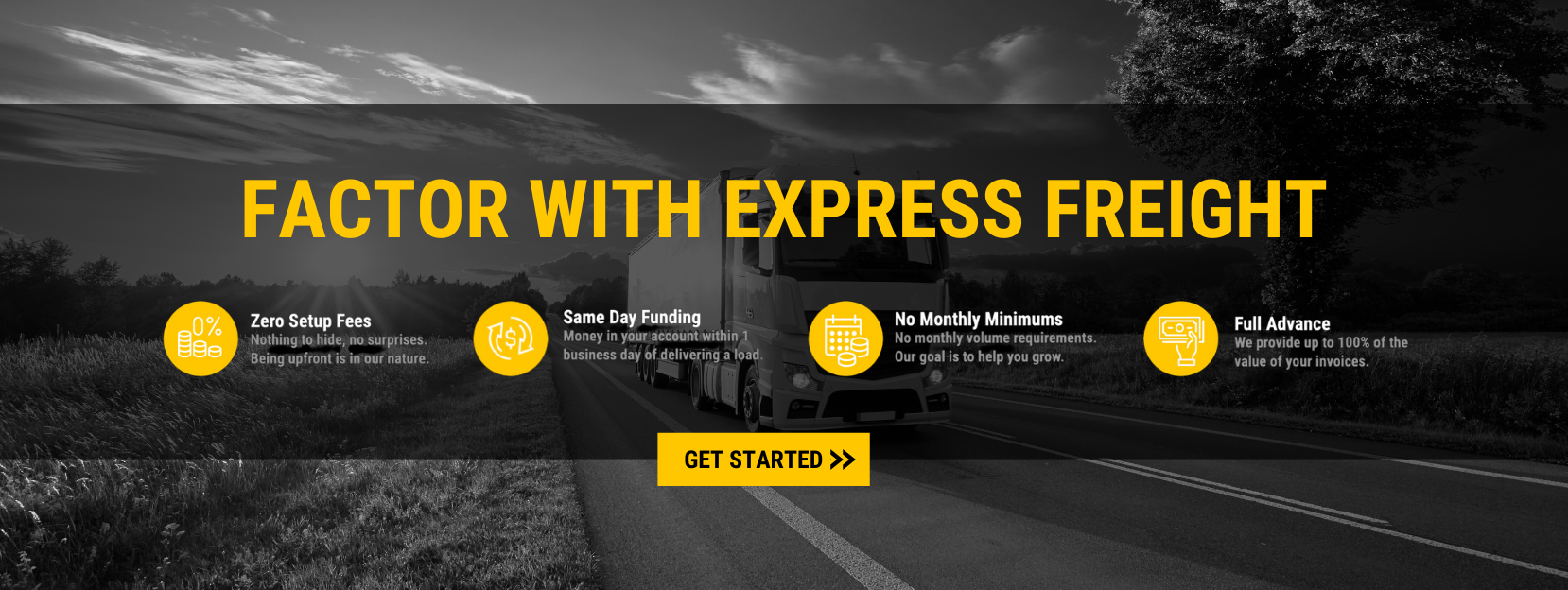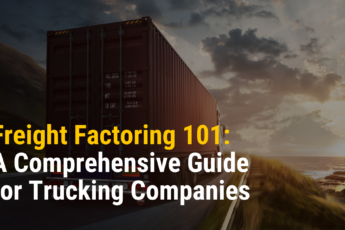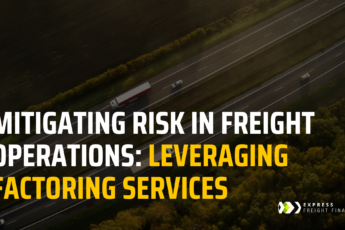For truckers, average freight factoring fees range from 1% to 5% of the complete load payment. There are a number of hidden costs in the company’s contract and knowing about them ahead of time can spare you the difficulty and frustration of discovering them halfway through your contract’s term.
Here, we break down the most common factoring fees to be aware of, to ensure you get the best deal for your trucking company.
Understanding the Top Factors that Affect your Factoring Rate
There are several factors that can play a huge role in affecting your rate with the factoring company. It’s important you check these boxes before approaching the company.
- Your Credit History and Age of Business
- Your Customer’s Credit History
- The Volume of Invoices You Factor
- Invoice Amounts
- Recourse vs. Non-Recourse Factoring
- Amount of Time it Takes the Customer to Pay
Your Credit History and Age of Business
Your creditworthiness is one of the several checklist items a factoring company would review in order to guarantee there’s a low risk in financing your business. In order to factor an invoice, the majority of factoring providers require a credit score of 530 or higher, and you need to have been in business for at least 90 days.
Your Customers’ Credit History
It’s just as crucial to check your credit score as it is to verify your customer’s creditworthiness. This helps guarantee that they can pay when they are supposed to. As you read further, we will discuss what to do in the event that your customer cannot pay.
Volume of Invoice Factored
The factoring company will get a percentage of the full price for the load. As previously indicated, most factoring companies require 1% to 5% of the charge that the customer will pay. For example, if the entire amount is $5,000, a 2.5% factoring business would offer you $4,876 and $125 would go to your factoring company.
Watch out for any factoring offer above 3% and make sure to get a few quotes before signing any contract. The team at Express Freight Finance, for instance, evaluates several factoring contracts a year and is often able to offer better rates.
Recourse vs. Non-Recourse Factoring
Recourse versus non-recourse is a technical term in a factoring contract that is often disregarded. However, knowing the difference is vital in determining your rate, as well as preventing unexpected expenses. In a non-recourse factoring agreement, if your client is unable to pay, your factor will not require you to then pay that amount.
This occurs in rare instances when a customer files for bankruptcy between the time the invoice is submitted and the time the money is due. In a recourse factoring agreement, on the other hand, you may be held personally liable for that debt.
The Amount of Time It Takes Your Clients to Pay
Customers are given a certain amount of time to pay, and if they do not do so within that time frame, they will be charged a few fees along the way. It’s frequently done on a tiered system, which means you pay a given amount for a certain number of days, and then the percentage increases.
Some factoring companies will not proactively let you know when your customer is coming up on their deadline to pay. Watch out for fees that can pile up based on this common issue that’s out of your control.
11 Hidden Fees to Watch Out For in Freight Factoring
When signing up or renewing your contract with a freight factoring company, there may be certain expenses that are hidden in the contract, so you must be attentive and ask questions. We’ve highlighted them below.
- Application Fees
- Setup Fees
- Credit Check Fees (for your customers)
- Wire Transfer Fees or Money Disbursement Fees
- Due Diligence Fees
- Late Fees
- Customer Service Fees
- Processing Fees
- Invoice Discounting Rates
- Minimum Volume Requirements
- Cancellation Fees
Application Fees
The application fee is the amount that is normally levied at the time of sign-up. It is typically a one-time payment that shows your willingness to enter into an agreement with the factoring company. This creates a favorable environment for additional business discussions and negotiations.
Setup Fees
This is also a one-time fee paid at the start of the transaction between you and the factoring company. This is typically used to keep your account current, provide required reports, and process legal papers.
Credit Check Fees
This fee is used to conduct credit checks for both you and your customer. It’s a crucial stage since it shows the factoring firm that the customer can pay and that you have the resources to repay the costs if the consumer is unable to pay.
Wire Transfer Fees or Money Disbursement Fees
This includes all fees and charges incurred during the disbursement of funds, as well as the maintenance of reserves for each invoice. Payment mechanisms such as wire transfer, ACH, and money codes may all incur fees.
Due Diligence Fees
This is a non-refundable fee paid by your trucking firm to the freight factoring company to express interest in the slot and, if necessary, to secure it. The money is usually paid in whole, although it may be paid in installments as well.
Late Fees
These are fees incurred when the customer does not pay the money within the specified time. After the term has passed, this fee will begin to accrue based on the percentage stated in the contract.
Customer Service Fee
Most factoring companies offer customer service to their customers upon signing up, but in some cases, an additional fee is charged to use their customer service. This is often seen in large factoring companies.
Processing Fee
This fee is incurred during the initial stages of processing your application with the company. When signing a contract with a factoring company, you need to provide two important documents: an invoice and a bill of lading (BOL). Processing fees are also used to process these documents.
Invoice Discounting Rate
Invoice discounting and invoice factoring are two phrases that have often been interchanged. When a trucking company implements invoice discounting, it approaches a factoring company and asks for a specific amount of money, then uses the invoice as collateral.
The trucking company keeps control of the ledger in this situation, and the consumer is unaware that another financial transaction is taking place. It’s also known as “discreet invoicing.”
Minimum Volume Requirement
Some factoring providers have a contract requirement that you factor a certain number of invoices per month. If you do not meet the minimum number of factored invoices for the month for any reason, you will be charged a fee to compensate for the profit they could have made.
Cancellation Fees
Because they offer some of the cheapest rates, many large factoring companies require you to sign a contract that will expire after a specific number of years. As a result, the factoring business will handle your load fees for the next two years, and if you decide to terminate before the end of the contract, you will be required to pay penalties to offset part of the profit they may have made.
Conclusion
Freight factoring helps many small trucking businesses grow with the range of financing options they’re able to provide. Still, it’s important to remain in control of the amount of money you’re investing in your freight factoring company. If you’re about to sign a freight factoring contract, make sure you’re looking at and asking about these eleven fees that are oftentimes buried in the fine print.







